Expectations and Reality: A Kiwi House-Dad in Bavaria
November 2016
Tales of Transition
By Matt Colville
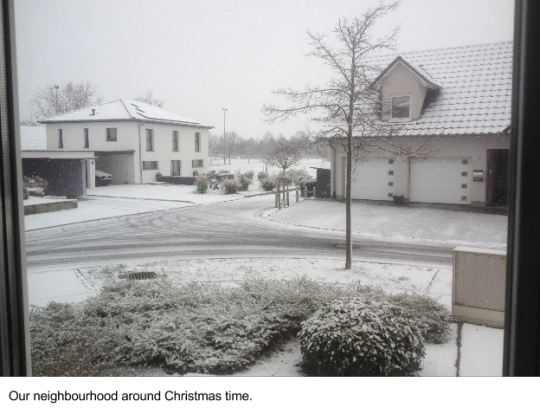 In my twenties, I travelled some. A couple of summer stints working on Hamilton Island in Australia. Two surf trips to Indonesia. A month in the USA. Two extended trips chasing girls around the European Union.
In my twenties, I travelled some. A couple of summer stints working on Hamilton Island in Australia. Two surf trips to Indonesia. A month in the USA. Two extended trips chasing girls around the European Union.
But I’ve always wanted to live in Europe. And despite the joy of my partner getting pregnant three years ago, it triggered a small nervous breakdown, as I thought my dream was fading.
So, after months of searching, my wife ? who has taught in Europe before ? gained a job in a small international school, in a tiny village in southern Germany. We swapped roles, and now I’m at home with our son. And by and large, it is great. But there have been many challenges along the way.
Money
If you want to live abroad, please, please, for the love of God, have enough money saved before you leave.
We didn’t. My approach to budgeting was to insist wildly that we were going to move overseas come hell or high water. My financial planning acumen was similar to that of an ostrich with its head firmly planted in the sand. My wife had sole access to our accounts and did her best with our single income from my teaching, and voiced her concerns several times about a possible lack of savings. I chose not to listen. A firm feeling of entitlement had engulfed me.
A stop in Thailand on the way over depleted our savings, so that, on arrival, we only had a meager amount. Straight away, we had to pay:
- Three months rent as a bond to our landlord ? in New Zealand, where I come from, it is commonly two weeks.
- One month rent in advance.
- Furniture. We brought our suitcases, a car seat and pram, and my surfboard.We immediately purchased beds, a couch, a washing machine, a wardrobe, and a table. We add to our apartment month by month, but, for several months, it was a bit desolate. The smallest sounds still reverberate in our cavernous living room. The acoustics would be great for a recording studio ? unfortunately, not so good for living with a loud toddler.
- A car. We live in a tiny village, albeit with easy access to the Autobahn. Buses exist, but are rare. A car was a necessity.
- We had to paint our apartment and install light fittings. We were very lucky that a kitchen was already present, because often Germans take their kitchens with them.
For some fantastic reason, we didn’t need to sit our driving licence here. Some do, and it costs thousands. And we must also say that the German government is paying us Kindergeld (child money) because we have a child. We did not expect this and are wildly grateful.
There’s nothing spiritual about being broke. It creates anxiety, and discord. On the other hand, wealth, as Joan Didion said, creates “absolute personal freedom, mobility, privacy”. After a period of feeling terrified, angry, bitter, and resentful, I can ultimately see I will be learning some pretty solid financial lessons, which I can pass onto my son.
And of course, we are surviving, and compared to many, very comfortable. We simply go without some luxuries ? though not always cheerfully. We eat cheaply, and put off buying whatever we can. With penny pinching and some sacrifices, we are able to service the debt we incurred while relocating, travel, and give our son good experiences. And anyway, right now 12 kilometers away in the city of Schweinfurt, 2000 Syrian refugees live in an old American army base. Our worries would be pitiful compared to theirs. Many are probably mourning deceased family and friends, or thinking of those they left behind.
Language
I didn’t learn a language at school. Living in isolated New Zealand, I didn’t see the point. Now, I wish I had.
Indeed, it would seem that learning languages is much easier when young. As journalist David McWilliams notes: After age 10, learning new words becomes progressively harder until, as adults, it is exceedingly difficult. The older you get, the more you use your native language and the more it comes to dominate your linguistic map. You still have brain plasticity, but your mother tongue rules. Your brain trains itself to not pay attention to foreign sounds, and the space in your head dedicated to language gets rather crowded.
At least my son will probably be fine. He starts in a German kindergarten in six months, and will almost certainly learn faster than I have. And the benefits of learning a second language young are vast.
I arrived blind, with a naive presumption of one year until fluency with minimal effort. Instead, we were instantly deluged by visa requirements and forms, driver’s licence transfers, a rental agreement, and several types of insurance. I still don’t know how to do any of this. My wife has basic German from living in Switzerland, but it was her sister ? who coincidentally happens to live less than an hour from us and is fluent in German ? who guided us through. Without them, I honestly don’t know what I would have done ? because everything was literally foreign, and while all Germans now learn English at school, if they don’t use it, they lose it.
I enrolled in a basic (A1) Deutschkurs at the local Volkshochschule. It was really quite cheap for two 1.5-hour classes per week. Everything is in German. It started great but got hard, fast. The grammar is excruciating, at least for me. For example (thanks, Wikipedia): As a fusional language, German marks nouns, pronouns, articles, and adjectives to distinguish case, number, and gender. For example, all German adjectives have several different forms. The adjective neu (new), for example, can be written in five different ways (neue, neuer, neues, neuen, neuem) depending on the gender of the noun that it modifies, whether the noun is singular or plural, and the role of the noun in the sentence. English completely lacks such declensions, meaning that an adjective can be written in only one form.
With the increase in difficulty came a corresponding decrease in self-confidence and sense of mastery. When called on by my efficient but stern teacher, I made mistakes. I blushed, sweated, squirmed. I felt paranoid. I experienced spasms of rage. And I thought, many times, of giving it up.
But I haven’t. I will tell my son, when he’s older, that you don’t give up just because things are hard. That nothing good comes without hard work. For me to give up because it’s difficult, and because I have been humbled and my ego bruised, would make me a hypocrite.
(I have also noticed a funny link between me working harder on my homework and revising my notes and then having an enjoyable class experience, versus me binge watching multiple series on Netflix, dashing off my homework last minute, and then hating every minute of class)
Moreover, there is always the issue of motivation. I recently struck up a conversation with a couple in my class. They are great students and sound downright fluent to me. They always answer the teacher’s questions, and always correctly. Naturally, I tended to dislike them, being the spiritual giant I am. One day, though, we started talking, and I learned that they have emigrated from Greece, and are now both working full-time cleaning jobs for minimum wage while they learn the language, in hopes of being able to take advantage of free university education and thus improve their lot immeasurably.
I am studying more or less as a hobby. I will return to the comparative paradise of New Zealand in a few years. They study because their lives depend on it ? or, at least, the quality of their lives. Currently, I am a stay at home dad, while my wife teaches at an international school. She earns more than double both their incomes.
No wonder they are better than me. And good on them too.
Social Life
I knew this would be difficult, and I knew I had to be proactive, so I started going to Krabbelgruppe (playgroup) with my son as soon as we arrived. This entailed me hanging out with anywhere from 5-10 German Frauen (women) for 90 minutes while the kids played. My son loved it. I was ok with it. Some days, I wouldn’t say a single word. On one memorable occasion it was only me and one other lady, who didn’t speak English, and it was a long 90 minutes.
I found a Laufgruppe (running club) online via a Google search. This was a good move. I was exotic - people lit up when I said I was from New Zealand. Some spoke English with me, with others I try my Deutsch. This is still the highlight of my social life.
However, on my off-days ? of which there are a considerable number ? I am prone to silently criticizing my host people as reserved, cold, and intolerant. But then it is easy to remember the many Kiwis I know who are flawed, including myself. And while certainly quite reserved, the Germans here are extremely polite ? everyone says Hallo, and we always feel safe.
In this culture, people have traditions, long family histories, and families have often lived in villages for generations. This may explain the reserved nature ? people here don’t really need to make more friends. Sometimes though, a kernel of resentment grows in me, as I contemplate whether I would be more friendly to immigrants. At the moment my friends and acquaintances are mostly expats. The locals are harder to crack. But I’ll get there. I think if you’re friendly, you will make friends.
Sights, tastes, sounds, experiences
The reason we are here!
Our village is lovely ? a real Bavarian dorf. We have four other villages within a 10 kilometer circumference.The architecture is fascinating, and castles dot the landscape. Bavaria itself is wonderful, steeped in history and culture. We’ve been to lovely cities such as Munich, Rothenburg, Bamberg, Nuremberg, and Würzburg.
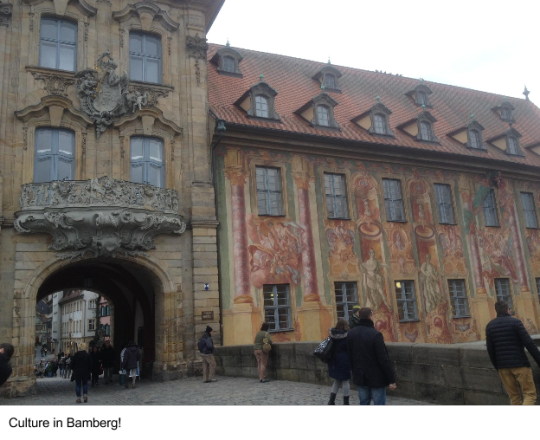
In terms of refreshment, Germans love their beer. But in my opinion, they drink it well. It’s cheap, it’s good, and they don’t seem to scull it, then rush out and do obnoxious or violent acts. The bread is great, and the meat too ? though a surfeit of pork.
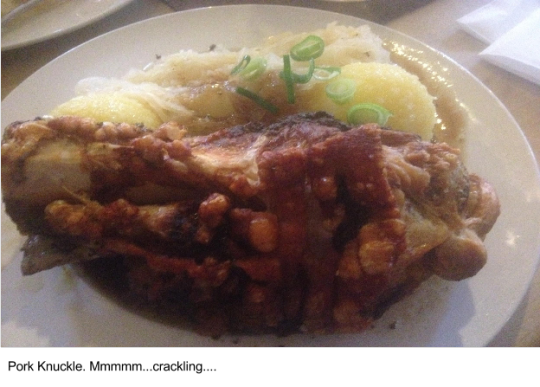
I’ve mentioned Krabbelgruppe. I also take my son to swimming lessons, dance class, music class, and the local Sporthalle. Germans do this kind of thing really well ? community is important. Both Krabbelgruppe and the Sporthalle only charge tiny fees, and even the private swimming, music and dance classes are affordable. We socialise with our upstairs neighbours and have bonded over our toddlers.
I’m not afraid to adapt ? to learn the lingo and traditions, and be mindful of the fact that I am in a foreign country. But some things don’t change, and I refuse to assimilate entirely. My jandals (flip flops) stay on during summer outside ? which draws no end of funny looks and blatant staring from locals who wear these only inside. I wear shorts until it is sub-zero. And my front door and the car were often unlocked until I was scolded by our neighbour.
We took part in Fasching this year ? a kind of German Carnivale. Lots of fun, and we got to see the extroverted side of our locals (no doubt aided by excess alcohol consumption). It was a fun day with great vibes, kids everywhere, and a part of me thought I wouldn’t see a day like this back home without inevitable alcohol related incidents.

Germany is not always known for its landscape, but the wide open spaces we see driving or when I’m running are often breathtaking. There is a church in every village, very well maintained, despite the statistics which show that German religious belief is dwindling.The religious imagery is ubiquitous in our part of the country ? statues of Christ and Mother Mary dot the landscape, forming pilgrimage routes.

And of course, we are in Bavaria, and the Nazi history is horribly fascinating. We visited Dachau during our Munich trip, and the smaller Flossenburg on our way to Czechia. Nuremberg was Hitler’s favourite city, and Rothenburg was the ideal of a Nazi town.
We have travelled abroad already several times, and live in an ideal, central position. We’ve done Holland ? our first trip, and better left unspoken. Strasbourg to see friends was much better, as was Paris by myself ? a birthday present from my lovely wife. The Czech Republic was like a wonderful, cheap, fairytale. And soon we are off to Switzerland, and then, Portugal. Big plans for trips to exotic destinations such as Israel and Morocco are gestating.
In my magical thinking, back home, I imagined seamless travel and trains and planes running from my doorstep to Rome, Paris, Vienna ? all the places I wanted to go. The reality of travel, especially with a toddler, is much different, and there have been many tantrums. Some of them have even been from our son. Like everything though, there has been a painful learning curve, and now we have established tools, routines, and coping mechanisms. Thank God for naps and smartphones, WiFi and Peppa Pig.
Fatherhood and status
The species known as the Hausmann (house-husband) is not ubiquitous in Deutschland, to say the least. I have never met one, and only heard of one through a friend of a friend. Things are pretty traditional here, and patriarchal. I’ve been treated with respect, at least to my face, but also with some barely hidden scepticism and puzzlement. Status seems to be fairly essential in this country. A good job, ambition and making money are importan
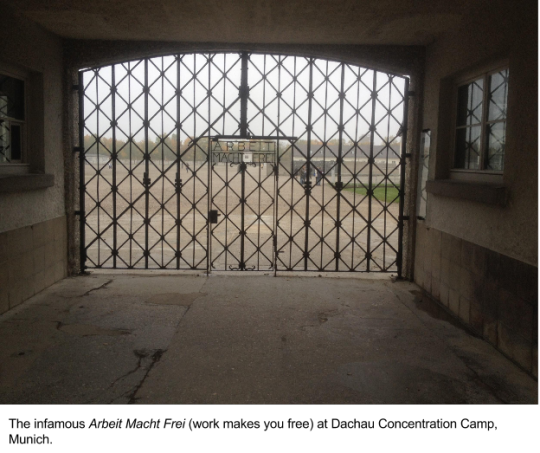
t. That’s fair enough, I want all those things too, but right now we are on one income until my son reaches school, so that that he will always have one parent at home, and at the moment it’s my turn. I get to try to be the father I always wanted, and never had. And I’m doing alright, most of the time. My son is currently in a phase of repeatedly saying “I don’t like Dadda” which would seem to signify poor client feedback, but I’m assured by my wife and other parents that this is normal.
Back in New Zealand, a flash car was a rarity outside of Auckland; here, it is the norm. BMWs, Mercedes and Porsches line the streets, and fly past at unbelievable and surely unsafe speeds on the Autobahn. Yes, they are made here - Germans are famous for their cars - but they’re still bloody expensive, and word of mouth would lead me to believe lots of people own cars they can’t really afford, and even put off home ownership to do so.
I drive one of the smallest cars in this country ? literally. The Peugeot 206 is a reliable car, but not given to producing stares of envy.
I’m not a car guy ? couldn’t tell a muffler from a carburettor ? but I admit to several stabs of jealousy seeing these undeniably beautiful and expensive machines everywhere.
I had thought of introducing myself as a writer, but the few times I have tried, and been asked whether I get paid paid for it (not really) or where they could have seen me (a New Zealand website) I have felt so awkward, and uncool, that I gave that up.
Being a stay at home parent is hard anywhere. I made it particularly challenging for myself by choosing to do it as a man, in a foreign country, in a small village where people are quite reserved. Looking back, I am sure I have been valiantly fighting off some low level depression due to the isolation caused by this, despite inner resolve that I would never let myself get depressed again.
Conclusion
All in all, we’re glad to be here. Birds singing and the smell of freshly cut grass signify spring has finally sprung after a bleak winter. Our tiny village is otherwise quiet. The sound of a plane droning overhead would in the past produce in me aching pangs of existential ennui and melancholy
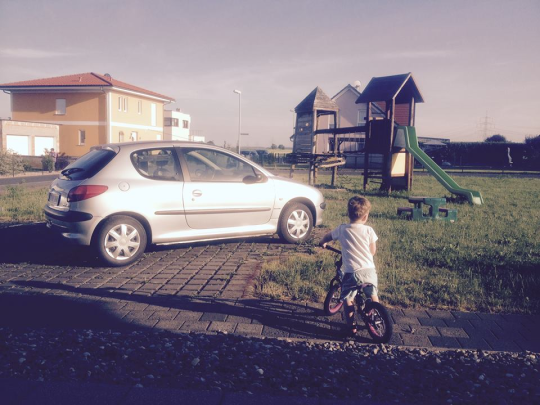
. I would be tortured by the idea that a better life was somewhere else. Invoking Pound, I would think:
And the days are not full enough
And the nights are not full enough
And life slips by like a field mouse
Not shaking the grass
I don’t think that now. I made it to Europe. We live in a Bavarian village which turns 1225 years old this year. We’ve been here for nine months ? the gestation period, no less, with all its labour pains. More importantly, I know that the temptation to think a better life is being lived elsewhere is universal, and misleading, because we always take ourselves with us. But I live in beautiful and exotic Bavaria, with my wonderful family. My son will wake up soon and I will take him to play with our upstairs neighbours and their daughter, where I will practise my mangled Deutsch. Later, when my wife gets home, we will continue planning a trip to Switzerland, and discuss our future vacation to Portugal. Life is good.
What makes this experience is not the sights, or the photos we put on Facebook. It is the people. Robert Louis Stevenson once said, “It is the history of our kindnesses that alone make this world tolerable. If it were not for that, for the effect of kind words, kind looks, kind letters … I should be inclined to think our life a practical jest in the worst possible spirit.”
It’s true. My moments or days of loneliness, homesickness and angst are often alleviated by the kindness of new friends and strangers. The local guy who made an effort to talk to me and my son at the playground. The old lady who bought my son a Kinder Surprise at the supermarket checkout. Our upstairs neighbour who lent us their old dining room chairs before we bought our own, fixed my son’s tricycle, helped me with my Deutsch homework, and invited us into her home.
The latter saved me, in a way, one day. Early on at my son’s playgroup I tried to make a coffee using the machine, and grew frustrated when I couldn’t work it out. I got a bit rough (like a bull at a gate, my dear mother always said) and consequently, broke it ? accidentally. I was then subject to some, in my mind, fairly passive aggressive requests to buy a new one, and I acquiesced. The language barrier was never more pronounced than it was then. And I was so bloody frustrated, and hurt, and lonely after this seemingly trivial incident and misunderstanding, that I went home and felt like weeping. Maybe I did, a little bit ? don’t tell any other Kiwis I said that though. The isolation was getting to me, despite my stoic facade.
And then the doorbell rings, I dry my eyes and greet my upstairs neighbor, who also attends playgroup, but who I had hitherto not spoken to. She told me, in broken English, not to worry about the coffee machine. It was old, and faulty she said, and she had told the “leader” that I didn’t need to pay for it. Turns out it was fixable anyway. The point is, this small act of kindness, which later she could barely remember, completely transformed not just my day, but my mindset. My faith in humanity was resolved, and I was back on track. I learnt again that despite yearnings for self sufficiency ? because sooner or later, everyone lets you down ? no-one can do it alone. The neighbour and I are now friends, and my son is best friends with her daughter.
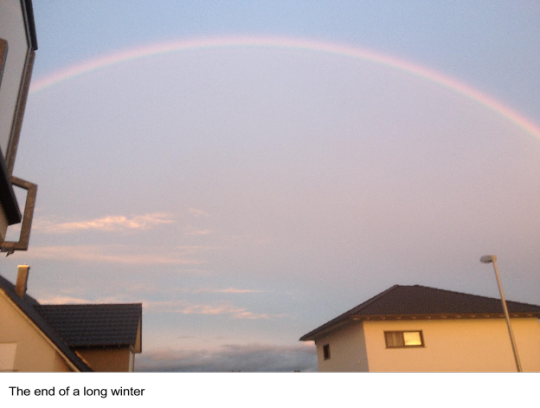
People are people, the world over. It is connection which makes our human experience worthwhile. I leave you with a traditional Maori proverb from New Zealand:
He aha te mea nui?
He tangata.
He tangata.
He tangata.
What is the most important thing?
It is people
It is people
It is people.
© 2016 by Matt Colville. All rights reserved.
Matt Colville is a 32 year old writer, teacher, and house-dad from New Zealand, currently living in Bavaria. Visit his website at http://www.freelancewriters.net.nz/



